- Home
- David Leavitt
The Indian Clerk Page 4
The Indian Clerk Read online
Page 4
“It sounds as if it would be rather fun,” O. B. said. “Anyway, I still think you're making an artificial distinction. One kind of uselessness you glorify because you enjoy it, the other kind you condemn because you find it dull. But it comes to the same thing.”
Hardy was silent. It was obvious that O. B. didn't understand, would never understand. Only a mathematician could. O. B. didn't know what it felt like to be dragged away from something in which you believed passionately and forced to fix your attention on something you despised. Nor did he understand the injustice of being obliged to devote years of effort to the acquisition of skills that, once the tripos was over and done with, you would never again be called upon to employ. More and more O. B. lived for spectacle: the petits-fours served and the music played at his “at homes,” where sailors mingled with dons. He did not care about ideas or ideals. His fellowship, so far as Hardy could tell, mattered to him only because it allowed him to remain forever ensconced within the safe confines of King's College. By nature he was a creature of the college. Most of the Apostles were. A few years earlier McTaggart had written of heaven: “It might be said of a College with as much truth as it has been said of the Absolute, that it is a unity, that is a unity of spirit, and that none of that spirit exists except as personal.” But of course “the Absolute is a far more perfect unity than a College.” With such a sentiment O. B. would not likely have been in agreement, as for him King's was the perfect unity.
O. B., Hardy knew, did not much care for McTaggart. Nor did he appreciate McTaggart's “religion,” a sort of anti-Christian Christianity in which Platonic souls ascended to a paradise without a God. Hardy felt the same way. One of McTaggart's many behavioral oddities was that he walked sideways—a habit cultivated during his school days, when he had had to keep close to walls in order to avoid being kicked. He suffered from a slight curvature of the spine, and navigated the streets of Cambridge on a lumbering antique tricycle. Years before, he had delivered a paper to the Society entitled “Violets or Orange-Blossom?” in which he put forward an eloquent defense of love between men, which he believed to be superior to love between men and women, so long as a clear distinction was drawn between the “lower sodomy” and the “higher sodomy.” When he first gave his paper, McTaggart firmly allied himself with the higher sodomy, and still did, despite his recent marriage to a robust New Zealand girl, Daisy Bird, whom he proudly described as being “not the least bit feminine” and with whom, he told the brethren, he shared everything, including a passion for schoolboys.
All told, Hardy found G. E. Moore more (Moore, more) congenial. They met during Hardy's first year at Trinity. The father was five years older than the embryo, but looked the same age or even younger, which came as a relief. Already Hardy was growing tired of people mistaking him for a schoolboy. Although Moore was not handsome in a conventional sense, he radiated a childlike gloom that made you want to protect him and slap him, to tousle the hair creeping out over the wide forehead, and fondle the ears, which had no lobes, and kiss the look of perpetual surprise off his mouth. Not that Hardy ever had the chance to kiss away that look. The only intimacy Moore conceded was hand-holding. He was churlish on matters of sex—surprisingly so, given that one of the principal tenets of his own philosophy (a sort of simultaneous extension and refutation of McTaggart's) was the belief that pleasure is the highest good in life. Almost from the moment of his birth into the Apostles, he had been acknowledged as a genius, a savior sent down from the heaven of the angels to awaken the brethren from the torpor of the fin de siècle. Walking through the meadows of Grantchester with Hardy, his small hand somehow limp and at the same moment grasping, he would speak of “goodness.” For him, goodness was indefinable, yet also fundamental, the only soil in which a theory of ethics could take root. And where did goodness lie? In love and beauty. Perhaps unwittingly, Moore was offering the Apostles moral justification for the pursuit of activities at which most of them were already proficient: the cultivation of beautiful boys and the acquisition of beautiful objects. Later, out of his whole magnum opus, Principia Ethica, the reverent Bloomsbury set extracted a single phrase, placed it on a pedestal, and called it Moore's philosophy: “… personal affections and aesthetic enjoyments include all the greatest, and by far the greatest, goods we can imagine …”
Affection, enjoyment: on those walks in Grantchester, Hardy tried, and failed, to get Moore, by means of his own words, onto the grass. When their tussles concluded, as they inevitably did, in frustration and the brushing of dandelions off trousers, Moore would turn the conversation to mathematics. He would assure Hardy that he was absolutely right to want to pursue pure instead of applied mathematics. Prime numbers, for Moore, were part of the realm of goodness in a way that sex never could be.
All first loves may be fated to leave one feeling deluded. Hardy's and Moore's only lasted through the first year of Hardy's membership in the Society. Then Moore met Alfred Ainsworth. They paid their first visit to Ainsworth's rooms together on a winter evening, to see if Ainsworth might be embryo material. Ainsworth had fresh cheeks and smoky breath. As he talked, he flicked lit matches at the carpet. Afterward, as he and Moore were leaving, Hardy noticed the tiny burn marks that dotted the rug, growing in density until they formed a charred circle near the chair on which Ainsworth did his reading.
It was the first and only time in his life that anyone left him for someone else. Within a few weeks Moore's fondness for Ainsworth had developed into a full-fledged passion, though, as with Hardy, the affair never progressed beyond the hand-holding stage. This was in part because Ainsworth, unlike Hardy, regarded physical intimacy between men with distaste. Yet surely someone else—someone like John Maynard Keynes—could have nudged or badgered him into it. Once again, Moore's priggishness was the sticking point. When, at a gathering of the Society, Moore was asked to sing Schubert lieder (he had a lovely tenor voice), he attacked the music with gusto, all the while gazing at Ainsworth dreamily. But then he read a paper on whether it was possible to fall in love with someone purely on the basis of “mental qualities.” The knots he tied himself into! “Though, therefore, we may admit that the appreciation of a person's attitude towards other persons, or, to take one instance, the love of love, is far the most valuable good we know, and far more valuable than the mere love of beauty, yet we can only admit this if the first be understood to include the latter, in various degrees of directness.” Which was basically a way of saying that he could never fall in love with someone who was ugly.
Had Hardy not considered himself ugly—and had Moore not left him for Ainsworth (whom he, too, thought beautiful)—he might have greeted the betrayal with outrage or amusement. Instead he observed with dispassion the sorry spectacle of Moore undermining his own desire. Moore adored Ainsworth, he wanted obviously to sleep with Ainsworth, yet even as he went so far as to move to Edinburgh in order to live with Ainsworth, who was teaching there, he wouldn't admit it. Then Ainsworth married Moore's sister, and Moore returned to Cambridge. Hardy didn't know what to say to him when they first ran into each other. Congratulations on your sister's marriage to your great love? I'm sorry that he left you? It's what you deserve?
It didn't matter. He had learned something important from Moore: to go his own way. His name, he often thought, was providential. By nature Hardy was fibrous, pertinacious. He stuck to his guns. If the Apostles could overlook Christianity, convention, “the rules,” then he could just as easily cast his attention, as it were, across the stupidity of England, even across the obtuseness that fancied itself imperiousness and the ignorance that fancied itself superiority; across the emblematic channel itself. And where did that attention, once it had begun this tremendous journey, finally land? In Lower Saxony, in the small city of Göttingen, acknowledged capital of pure mathematics, city of Gauss and Riemann. Göttingen, which he had never visited, was Hardy's ideal. Whereas in Cambridge newsagents sold photographs of the senior wrangler, in Göttingen the shops sold picture postcards be
aring signed photographs of the great professors. Photographs of the city itself revealed it to be beautiful and ancient and ornate. From the rathaus with its gothic arches and noble spire, cobbled streets extended, small brick houses winking over them like grandmothers, their white balconies leaning out like aproned stomachs. In one of these houses, two centuries ago, the Göttingen Seven, two of whom were the brothers Grimm, had rebelled against the sovereignty of the kings of Hanover, while in another the great mathematician George Friedrich Bernhard Riemann had conjured—out of what? out of the ether?—a famous hypothesis concerning the distribution of the prime numbers. Yes, the Riemann hypothesis, which Hardy once made the mistake of trying to explain to the brethren. Still unproven. That was how he began his talk. “It is probably the most important unproven hypothesis in mathematics,” he said from the hearthrug, which sent a ripple of comment through the audience. Then he tried to lead them through the series of steps by which Riemann established a link between the seemingly arbitrary distribution of the primes and something called the “zeta function.” First he explained the prime number theorem, Gauss's method for calculating the number of primes up to a certain number n. Then, by way of indicating how far Cambridge had fallen behind the continent, he told the story of how, upon his arrival at Trinity, he had asked Love whether the theorem had been proven, and Love had said, yes, it had been proven, by Riemann—when in fact it had been proven only years after Riemann's death, independently, by Hadamard and de la Vallée Poussin. “You see,” he said, “we were that provincial.” At this Lytton Strachey, a recent birth (no. 239), gave a high-pitched, snorting laugh.
The problem was what Hardy called the error term. The theorem inevitably overestimated the number of primes up to n. And though Riemann and others had come up with formulae to lessen the error term, no one had been able to get rid of it altogether.
This was where the zeta function came in. Hardy wrote it out on a blackboard:
The function, when fed with an ordinary integer, was fairly straightforward. But what if you fed it with an imaginary number? And what was an imaginary number? He had to backtrack. “We all know that 1 × 1 = 1,” he said. “And what does — 1 × — 1 equal?”
“Also 1,” Strachey said.
“Correct. So by definition, the square root of — 1 doesn't exist. Yet it's a very useful number.”
He wrote it in on the blackboard: √- 1. “We call this number i.”
He knew where this was going to lead: a long argument about the phenomenal and the real. If outside this room, Strachey said, outside this Saturday evening, i was imaginary, then in this room, on this Saturday evening, i must be real. And why? Because in the world that was not this room, this Saturday evening, the opposite was true. For the brethren, only the life of the meetings was real. Everything else was “phenomenal.” Thus the Apostles embraced i without having the faintest idea what it meant.
After the talk was over, O. B. patted him on the back. “God willing, you'll be the man to prove it,” he said, which was deliberate provocation: O. B. knew as well as any of them that Hardy had long since renounced God, going so far as to ask the dean of Trinity for permission not to attend chapel, and then, at the dean's insistence, writing to inform his parents that he was no longer a believer. Gertrude pretended to weep, Mrs. Hardy wept, Isaac Hardy refused to speak to his son. A few months later, his father contracted pneumonia, and Hardy's mother begged him to reconsider his choice. To placate her, he agreed to meet with the vicar—the same, thin-fingered vicar by whom, years before, he'd been taken on a walk in the fog to discuss the kite. While they talked, the vicar ate chocolates from a tray. At a certain point Hardy noticed that the vicar was glancing, not very subtly, at his trousers. Well, well, he thought.
His father died the next evening. From that day on, Hardy never again set foot inside a Cambridge chapel. Even when some formal protocol required him to go into a chapel, he refused. Eventually Trinity had to issue a special dispensation on his behalf. By then, though, the college was more pliable. After all, Hardy was a don. And Oxford had sent out lures.
Occasionally, when he was working on the hypothesis, he'd remember his walk with the vicar. Looking for a proof, he'd think— that's like groping in a fog, feeling for a tug on the string. Somewhere high above you truth hovered—absolute, indisputable. When you felt the tug, it meant that you'd found the proof.
God had nothing to do with it. Proof was what connected you to the truth.
And what of the tripos?
Halfway through his first year Hardy went to Butler, the master of Trinity, and announced that he was giving up mathematics. He would rather change over to history, he said, return to Harold and the Battle of Hastings, than waste another minute in the gloom of Webb's ugly house.
Butler had a gift for quick thinking. He rotated his wedding ring a quarter turn (this was his habit) and sent Hardy off to talk to Love. Love, though an applied mathematician himself, recognized the source of Hardy's passion, and gave him a copy of Camille Jordan's three-volume Cours d'analyse de l'Ecole Polytechnique. This was the book, he later said, that changed his life, that taught him what it really meant to be a mathematician. Love also persuaded Hardy that if he quit mathematics just to avoid the tripos, he would be submitting to its tyranny far more completely than if he simply buckled down and took the thing.
The Cours d'analyse, Hardy told Littlewood, made the difference. The mere fact of knowing it awaited him on his shelf made it possible for him to endure Webb's coaching. So he resumed the protocol of memorization, practice, memorization, and when June came, he went to take the tripos with the first volume of the Cours d'analyse secreted in his coat pocket, as a talisman, and came out fourth wrangler.
For years afterward, naysayers grumbled that Hardy's subsequent determination to destroy the tripos was sour grapes, that it owed entirely to his not being named senior wrangler. This he denied vociferously. Nor, he insisted, did his not being named senior wrangler have anything to do with his decision, a month or so later, to leave Cambridge for Oxford. Had he been named senior wrangler, or twenty-seventh wrangler, or wooden spoon, he would have done the same. For the grudge he bore was not against the men who had scored higher than he had: it was against the tripos itself, and more generally, Cambridge, the insularity of which the tripos embodied, and more generally still, England, its rigidity and smug, unquestioning belief in its own superiority. In the end it took Moore to persuade him to stay. England, Moore told him, he could not remake. But perhaps he could remake the tripos.
From then on, tripos reform became his crusade. He waged a campaign that was passionate, intelligent, and unrelenting, and eventually, in 1910, he won: not only was the tripos modernized, the reading of the honors list was terminated. No longer would wranglers and optimes stroll the avenues of Cambridge in June. No longer would wooden spoons be handed down from the Senate House roof. Instead the tripos would be just another exam. None of which, he maintained, with just a hint of vexation in his voice, had anything to do with his having been named fourth wrangler. After all, Bertrand Russell had been seventh wrangler, and he was—well, Bertrand Russell. Had Hardy been senior wrangler, he would have felt the same way. Done the same thing. It was important to him that strangers understood and believed this.
5
FOR A WEEK, Hardy and Littlewood study the math. They sit together, either in Hardy's rooms or in Littlewood's, with the pages of the Indian's letter spread out before them, copying out the figures on a blackboard or on sheets of the expensive, creamy, eighty-pound paper that Hardy uses exclusively for what he calls “scribbling.” As they work, they drink tea or whiskey—all this a deviation from their usual routine of postcards and letters, but one that the situation seems to demand.
There are clashes, and when they occur, it seems to Hardy that they are the clashes of spouses, not collaborators. “You always have to finish the night so damn cheerful,” Littlewood says one night as he's putting on his coat.
“What's wrong
with that?”
“It's unrealistic, that's what. We work and work, we have to stop sometime, and you always make sure we stop when we think we've untangled something.”
“So? I like to go to bed feeling I've got something to look forward to in the morning.”
“But what if in the morning we find out we've made a blunder? That we're wrong? Half the time we are.”
“Then we'll work it out in the morning.”
“I'd rather go to bed knowing the worst.”
“Right, then. We'll stop when we're stuck. That way you can leave unhappy. Despairing. Gloomy. Is that what you'd prefer?”
“I do. Hope for the best, expect the worst, that's my philosophy.”
Most nights they're up past one. They pick over Ramanujan's results, make sense of some, fail to make sense of others, and, in the end, divide them into three rough categories: those that are either already known or easily deducible from known theorems; those that are new, but interesting only because they are curious or difficult; and those that are new, interesting, and important.

 Shelter in Place
Shelter in Place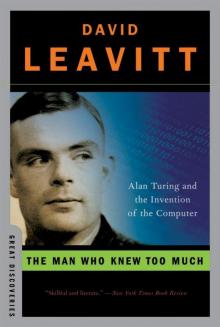 The Man Who Knew Too Much: Alan Turing and the Invention of the Computer (Great Discoveries)
The Man Who Knew Too Much: Alan Turing and the Invention of the Computer (Great Discoveries)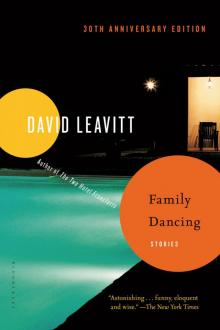 Family Dancing
Family Dancing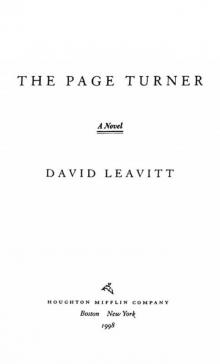 Page Turner Pa
Page Turner Pa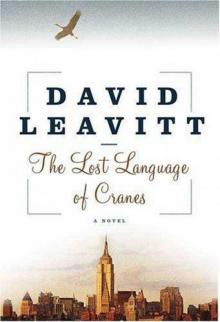 The Lost Language of Cranes: A Novel
The Lost Language of Cranes: A Novel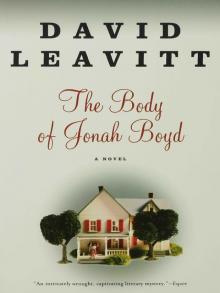 The Body of Jonah Boyd
The Body of Jonah Boyd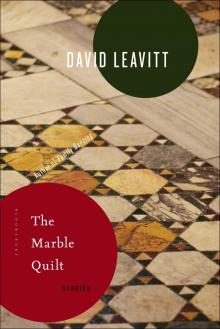 The Marble Quilt
The Marble Quilt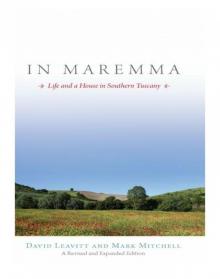 In Maremma
In Maremma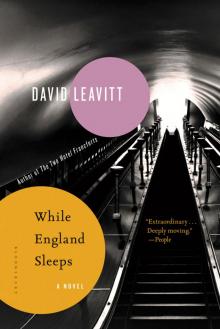 While England Sleeps
While England Sleeps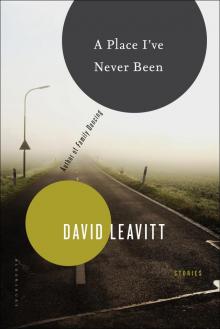 A Place I've Never Been
A Place I've Never Been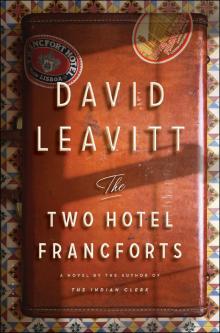 The Two Hotel Francforts
The Two Hotel Francforts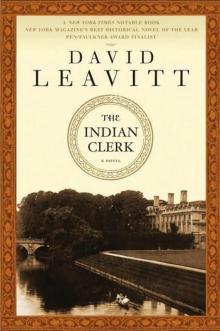 The Indian Clerk
The Indian Clerk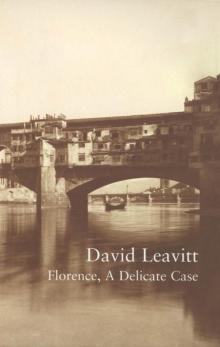 Florence
Florence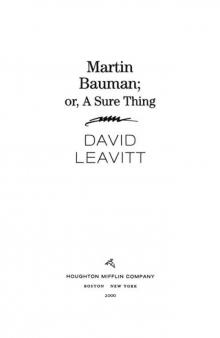 Martin Bauman
Martin Bauman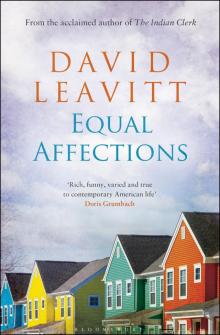 Equal Affections
Equal Affections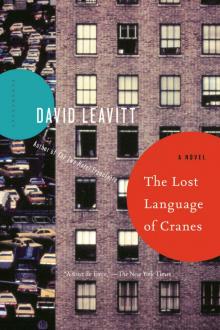 The Lost Language of Cranes
The Lost Language of Cranes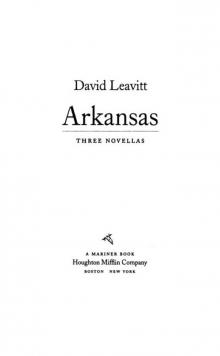 Arkansas
Arkansas